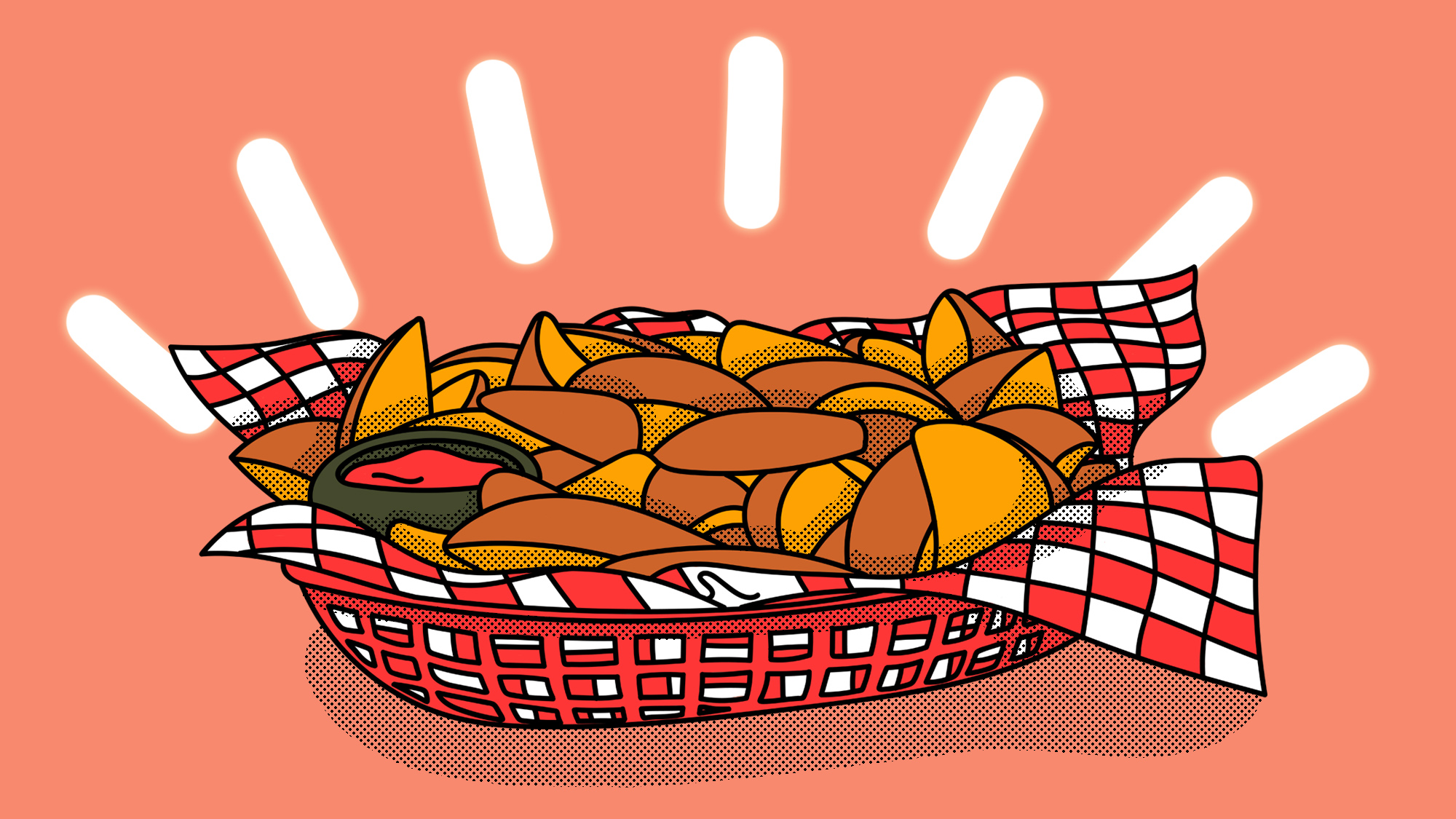Wedge Issue: Jojos Are The Paragon Of Fried Potatoes
I like to think I'm a connoisseur of fried potatoes. French fries or tots, curly or waffled, seasoned or plain, mayo or ketchup or both—the only fried potatoes I cannot abide are the soggy turds known as sweet potato tots.
So it prompted a near-existential crisis when I first saw jojos on a menu and had to ask what they were. I panicked: You mean to tell me that there is a fried potato item I haven't eaten? Who even am I? I immediately rectified this with a heaping order of the fried, seasoned slices of heaven, and I have been singing their praises since.
I can be forgiven for my initial oversight, I reason, because jojos are something of a regional delicacy. I had to move to Missoula, Montana—closer to the jojo epicenter of the Pacific Northwest—to first encounter them. But Akron, Ohio, also boasts strong jojo allegiances; a restaurant there called Fiesta Pizza & Chicken claims to have pioneered them.
Origins aside—we can dissect those legends later—jojos endure as a superior potato product. Are they actually potato wedges? Jojo enthusiasts claim a distinction. Yes, jojos are cut into thick pickle-shaped spears and seasoned, but it's in the frying technique where jojos break from the potato wedge pack. Jojos are often found at the same deli counters or bars that serve fried chicken, because the pressure fryer is what gives jojos their shatter-crispy outer layer. The telltale orange hue and vaguely chicken-nuggety flavor are side effects of this frying, and while the exterior breaks with a golden-fried crunch, the interior remains soft and crumbly, like the inside of a fluffy baked potato. Exemplary jojos are wrapped in a crispy outer jacket with down feather potatoey filling. Other types of potato wedges—even the trademarked Tater Babies—can be crispy, sure, but there's a precise texture to the outer layer that mystically sets the jojo apart.
I prefer mine dunked in ketchup, as the vinegary tang compliments jojos' fried potato essence in the same way it does French fries or tots. It also seems necessary to use some kind of condiment here, because jojos' thick cut makes their heavy starchiness even more apparent. May I also recommend a giant vat of soda with these?
Though jojos are worthy of gastronomic praise, you won't generally find them at upscale taverns or hip food trucks. It's more working class-food; I've found them at deli counters or sports bars or even under gas-stations' heat lamps next to the roller hot dogs. This is part of the charm, for me. Not that I'd expect jojos to be expensive, but a red-and-white cardboard boat of them from my grocery store's deli counter recently set me back a whopping $1.41.

Who can we credit for these cheap and delicious miracles, so as to properly thank them for their contributions to the pantheon of fried potatoes? Good luck pinning down any one person, as numerous people from Akron, Ohio to Vancouver, Washington claim to have been jojo's inventor. Aforementioned Fiesta Pizza & Chicken claims its founders, Alfred Ajamie and Walter Abood, introduced jojo potatoes in the mid-1960s. In Washington state, a restaurant-supply company owner named Nick Nicewonger tells Willamette Week his father, Paul, invented the jojo while selling pressure fryers around the same time. In the same article, a former president of another food-supply distributor tells a similar origin story, but claims it was a different company's salesman, from the Midwest, who invented them.
What does seem clear is that jojos originated with the pressure fryers that food-service manufacturers were eagerly pushing in the mid-20th century. Pressure fryers are as terrifying as they sound: pressure cookers filled with super-hot oil. But though scary-sounding, they allow meats like chicken to be fried incredibly fast, thus retaining key moisture that makes them juicy. Presumably, cooks wondered what else they could throw in their new-fangled fryers, and, sending a handful of potato wedges into the oily lava, gave birth to jojos.
Am I ever glad they did. While jojos hold a nostalgic place for some of my Pacific Northwest-raised friends, encrusted in county-fair memories or school lunch recollections, I—Jersey-reared—have no such history with them. I came to jojos as an adult, fully formed, with probably thousands of fried potatoes under my belt—literally—and still I can appreciate what they offer. Seasoned, crunchy, soft, and salty, they're the best of all possible potato worlds.
